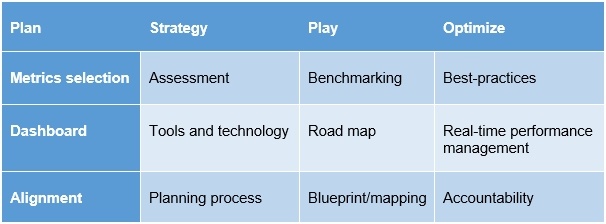With the convergence of online and offline marketing, the constantly increasing accessibility of data, and substantial improvements in analytical capabilities, marketers can now measure far more than they could just a few years ago.
Nowadays, as a marketer, you're necessarily measuring something. You could be selecting measures related to time and budget, or to website traffic, social engagement, and email response, or you could be opting for more sophisticated metrics of customer share of wallet, lifetime value, and share of preference.
Choosing the right marketing metrics is far more important than the quantity of data measured. Measuring the right data, and acting on the results found in the measurements, is an essential requirement for operating Marketing as a center of excellence.
Fifteen years of our own marketing performance research, as well as research by experts in academia such as Dr. Christine Moorman, or in industry such as the work performed by Deluxe, have found the keys to unlocking the ways to measure Marketing's impact on the business.
Measuring your marketing can indeed provide powerful results and benefits, but you have to choose the right measures. One way to make sure you keep your focus on the right measures is to have a marketing measurement playbook.
A playbook outlines a strategy for an activity; in this instance, the activity is selecting the right marketing metrics to measure and having a strategy to measure them.
Your marketing measurement playbook should provide you with a strategic approach for building your measurement processes, selecting your metrics, reporting those metrics in a way that delivers real business value, and executing the right activities to continue to improve over time.
The term "playbook" is inspired by sports, where the coach maintains a list of all the team's plays. A good marketing measurement playbook tells your team not only what to do but how to make it happen.
A play in the sports world is an action designed to achieve a specific purpose under specific conditions. When you design any type of playbook, you need to define the conditions; the condition is what triggers the action.
Make your measurement playbook actionable
A good measurement playbook defines your marketing metrics selection as well as your measurement process and methodology. To create a useful measurement playbook, the marketing team needs to do the following:
- Translate revenue targets into customer-centric outcomes.
- Establish outcome-based marketing objectives and metrics.
- Create the metrics relationships and chain between the marketing activities and the outcomes.
- Create and document the measurement process.
- Define the data sets and sources to support the measurement process and each metric in the chain.
- Prepare the team to be successful.
Include a section for each of those in your playbook, along with the plays. Rather than trying to anticipate every play (as you would with, say, football), you want to have a handle on the basic aspects of the game critical to success (offense, defense, and special teams) and the basic plays that occur in every game (inside run, outside run, forward pass, screen pass, player coverage, zone coverage, blitz, punt, field goal).
To help you start your journey toward measurement success, you may want to incorporate these aspects of measurement and basic plays into your Marketing Measurement Playbook.

Create your marketing measurement playbook
Step 1: Prepare
Assess your current state of marketing measurement and determine what conditions you need to address. It will be essential to understand your current data, analytics, measurement, and reporting capabilities and processes.
Build your playbook to address gaps in skills, resources/tools, and processes. Clarify, quantify, and communicate the value of the improvements.
These plays should improve Marketing's performance, relevance, influence, and credibility.
Step 2: Implement
Plan how you will implement and execute the playbook. In sports, coaches practice plays over and over again to facilitate proficiency. Have a plan for how you and your team will be able to consistently and proficiently use data, analytics, measurement, and reporting to improve and prove the value of your marketing.
Step 3: Evaluate and optimize
Compare your progress to your initial assessment. Evaluate how the new plays are positively affecting Marketing's performance, relevance, influence, and credibility, and determine what adjustments or new plays are necessary to optimize each of those areas.
(To learn more, read What You Must Know About Marketing Centers of Excellence: A Why and How Primer.)
More Resources on Marketing Measurement and Metrics
A Scientific Approach to Metrics, Measurement, and Marketing ROI | MarketingProfs Training Course
Advanced Measurement Strategies: Metrics That Actually Matter
The State of Marketing Attribution and Measurement: Do You Measure Up? [Infographic]




